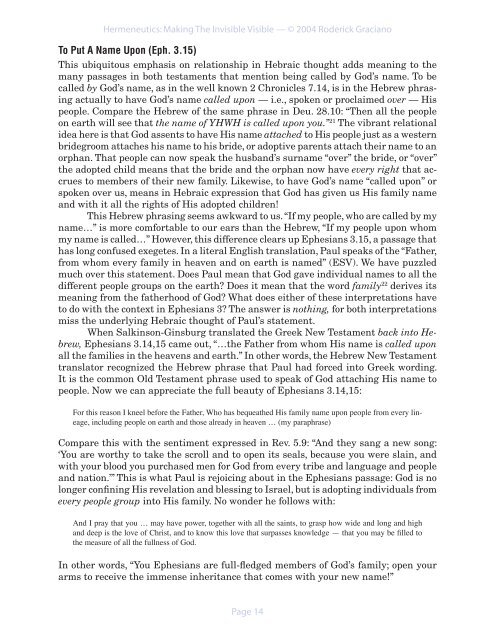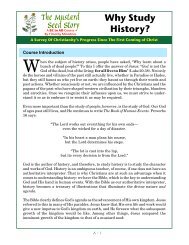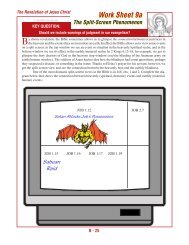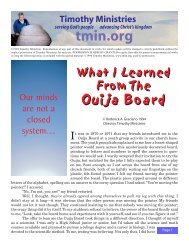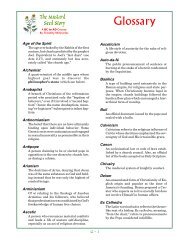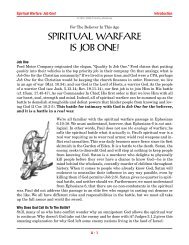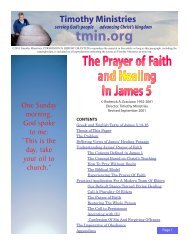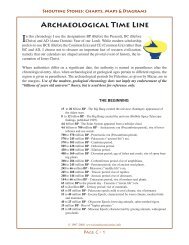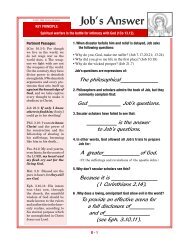Making The Invisible Visible Section 4
Making The Invisible Visible Section 4
Making The Invisible Visible Section 4
You also want an ePaper? Increase the reach of your titles
YUMPU automatically turns print PDFs into web optimized ePapers that Google loves.
Hermeneutics: <strong>Making</strong> <strong>The</strong> <strong>Invisible</strong> <strong>Visible</strong> — © 2004 Roderick Graciano<br />
To Put A Name Upon (Eph. 3.15)<br />
This ubiquitous emphasis on relationship in Hebraic thought adds meaning to the<br />
many passages in both testaments that mention being called by God’s name. To be<br />
called by God’s name, as in the well known 2 Chronicles 7.14, is in the Hebrew phrasing<br />
actually to have God’s name called upon — i.e., spoken or proclaimed over — His<br />
people. Compare the Hebrew of the same phrase in Deu. 28.10: “<strong>The</strong>n all the people<br />
on earth will see that the name of YHWH is called upon you.” 21 <strong>The</strong> vibrant relational<br />
idea here is that God assents to have His name attached to His people just as a western<br />
bridegroom attaches his name to his bride, or adoptive parents attach their name to an<br />
orphan. That people can now speak the husband’s surname “over” the bride, or “over”<br />
the adopted child means that the bride and the orphan now have every right that accrues<br />
to members of their new family. Likewise, to have God’s name “called upon” or<br />
spoken over us, means in Hebraic expression that God has given us His family name<br />
and with it all the rights of His adopted children!<br />
This Hebrew phrasing seems awkward to us. “If my people, who are called by my<br />
name…” is more comfortable to our ears than the Hebrew, “If my people upon whom<br />
my name is called…” However, this difference clears up Ephesians 3.15, a passage that<br />
has long confused exegetes. In a literal English translation, Paul speaks of the “Father,<br />
from whom every family in heaven and on earth is named” (ESV). We have puzzled<br />
much over this statement. Does Paul mean that God gave individual names to all the<br />
different people groups on the earth? Does it mean that the word family 22 derives its<br />
meaning from the fatherhood of God? What does either of these interpretations have<br />
to do with the context in Ephesians 3? <strong>The</strong> answer is nothing, for both interpretations<br />
miss the underlying Hebraic thought of Paul’s statement.<br />
When Salkinson-Ginsburg translated the Greek New Testament back into Hebrew,<br />
Ephesians 3.14,15 came out, “…the Father from whom His name is called upon<br />
all the families in the heavens and earth.” In other words, the Hebrew New Testament<br />
translator recognized the Hebrew phrase that Paul had forced into Greek wording.<br />
It is the common Old Testament phrase used to speak of God attaching His name to<br />
people. Now we can appreciate the full beauty of Ephesians 3.14,15:<br />
For this reason I kneel before the Father, Who has bequeathed His family name upon people from every lineage,<br />
including people on earth and those already in heaven … (my paraphrase)<br />
Compare this with the sentiment expressed in Rev. 5.9: “And they sang a new song:<br />
‘You are worthy to take the scroll and to open its seals, because you were slain, and<br />
with your blood you purchased men for God from every tribe and language and people<br />
and nation.’” This is what Paul is rejoicing about in the Ephesians passage: God is no<br />
longer confining His revelation and blessing to Israel, but is adopting individuals from<br />
every people group into His family. No wonder he follows with:<br />
And I pray that you … may have power, together with all the saints, to grasp how wide and long and high<br />
and deep is the love of Christ, and to know this love that surpasses knowledge — that you may be filled to<br />
the measure of all the fullness of God.<br />
In other words, “You Ephesians are full-fledged members of God’s family; open your<br />
arms to receive the immense inheritance that comes with your new name!”<br />
Page 14


